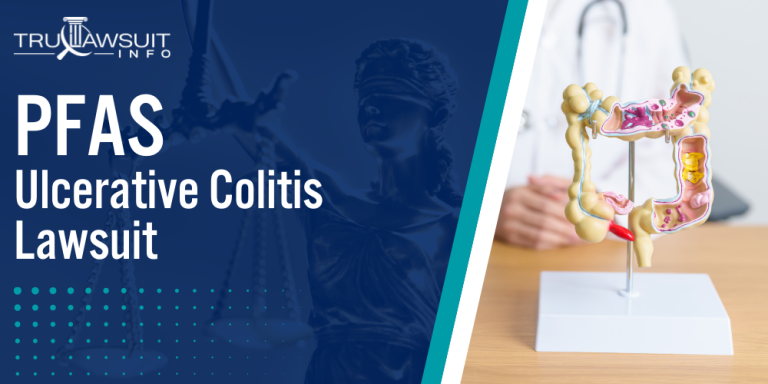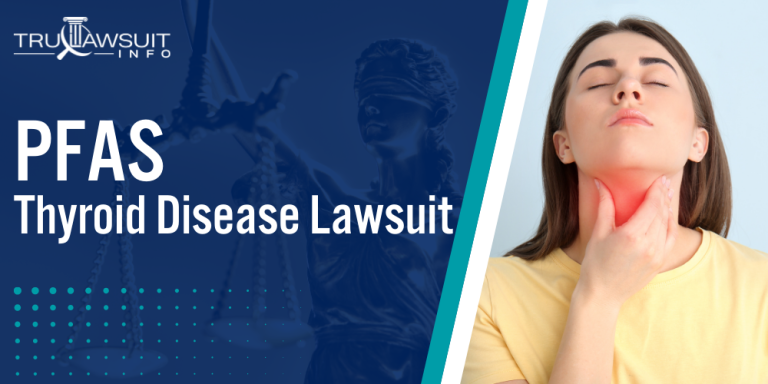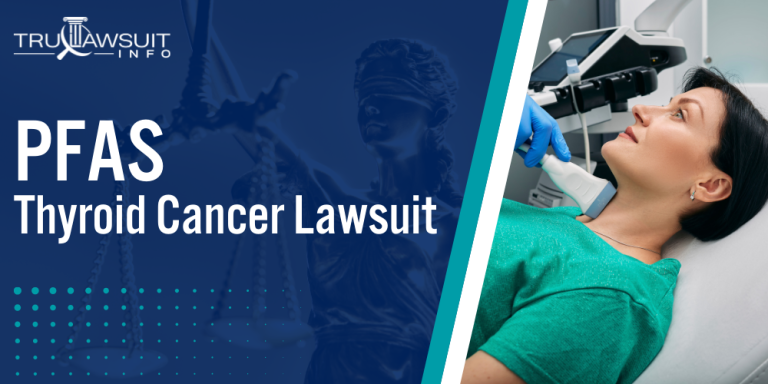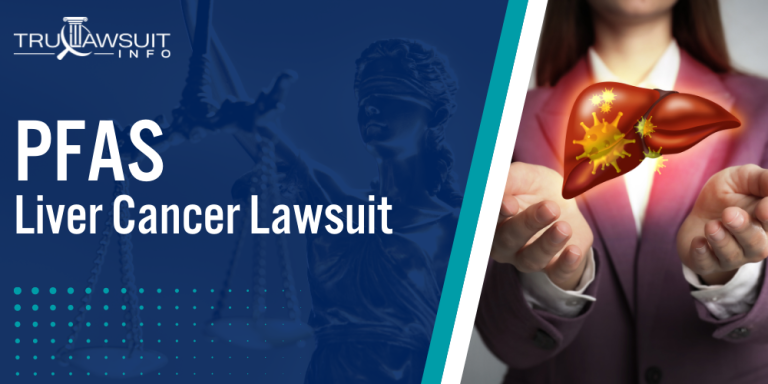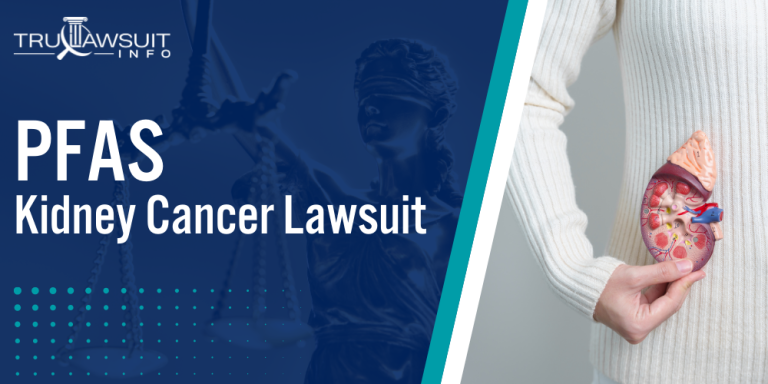Tepezza Lawsuit: FDA Approvals & Drug Regulation
Key Takeaways:
- The Tepezza lawsuit highlights the critical examination of FDA's approval process, raising questions about how rigorously the drug was vetted for safety and efficacy.
- The lawsuit against Tepezza may lead to changes in drug regulation policies, potentially tightening the requirements for pharmaceutical companies and ensuring greater patient safety.
- The Tepezza lawsuit emphasizes the importance of transparency, adherence to regulations, and ethical considerations in pharmaceutical development, which may influence future legislation and industry practices.
Tepezza Lawsuit: FDA Approvals & Drug Regulation
Did you know that the Tepezza product liability lawsuit has sparked a heated debate about the role of FDA approvals in drug regulation?
This intriguing product liability case not only raises questions but also emphasizes the importance of understanding how FDA approvals intersect with drug safety.
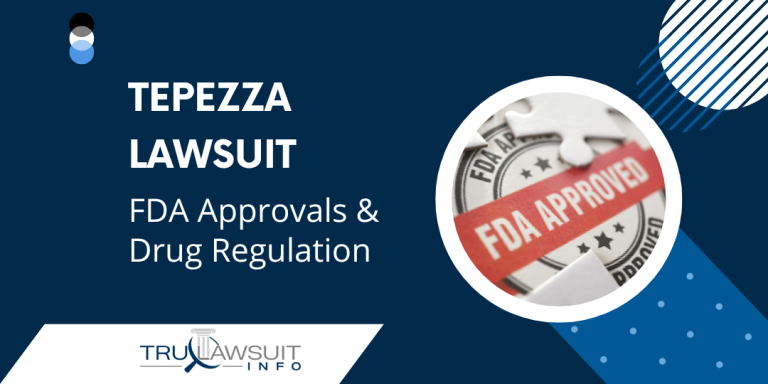
The Tepezza lawsuit serves as a stark reminder that monitoring drugs even after they receive FDA approval is crucial, especially in cases involving adverse reactions and potential federal preemption.
By examining this Tepezza product liability case, we can shed light on potential gaps in drug regulation that may impact plaintiffs who experience adverse reactions.
It’s essential to evaluate whether our current system adequately safeguards patients from potential risks associated with approved medications in multidistrict litigation.
The Tepezza lawsuit forces us to question whether the FDA’s stamp of approval guarantees complete safety or if there are areas where improvements can be made.
Join us as we explore these studies and uncover valuable insights into drug regulation, including the health problems that can arise.
Discover the latest research from Horizon Pharmaceuticals and gain a deeper understanding of these important issues.
Table of Contents
Impact of Tepezza Lawsuit on Hearing Loss Claims
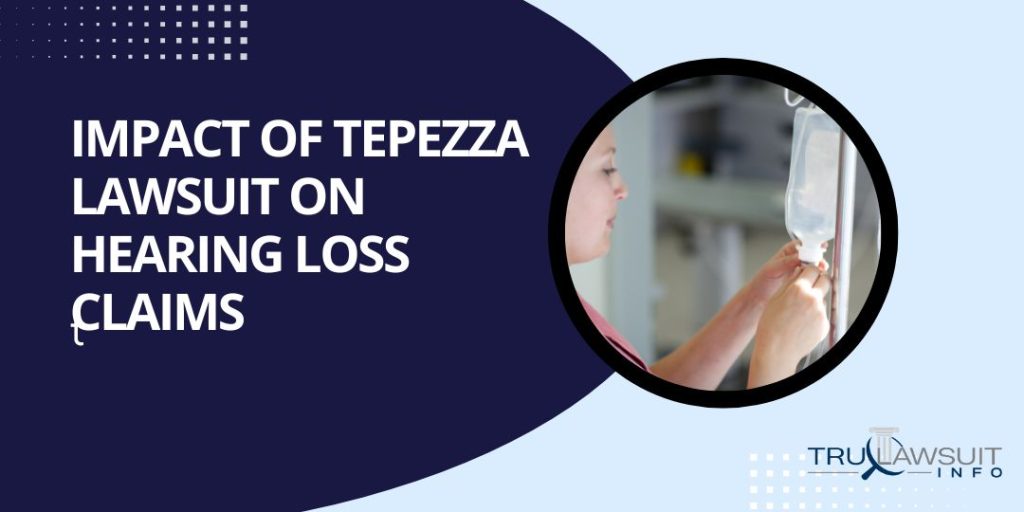
The Tepezza lawsuit has become a focal point in the discussion surrounding Tepezza lawsuit claims associated with the drug.
Plaintiffs who have experienced irreversible hearing damage are seeking damages through this lawsuit, hoping to hold the responsible parties accountable for their suffering.
Setting a Precedent for Future Lawsuits
One of the significant implications of the Tepezza hearing damage lawsuits is its potential impact on future lawsuits involving plaintiffs who have developed tinnitus due to similar drugs.
As the case progresses and a verdict is reached, it will set a precedent for how other multidistrict litigation cases involving hearing loss caused by medications are handled.
The outcome could influence compensation for affected individuals and prompt pharmaceutical companies to reassess their drug development processes and implement stricter safety measures.
Moreover, the Tepezza hearing damage lawsuit serves as a platform for individuals to voice their concerns regarding tinnitus and hearing loss caused by the medication teprotumumab.
It provides an opportunity for those affected by these injuries to share their experiences and raise awareness about this issue.
By highlighting the adverse effects associated with Tepezza, such lawsuits draw attention to potential risks of tinnitus and other injuries that may have gone unnoticed or underreported.
Seeking Justice for Pain and Suffering
The severity of irreversible tinnitus and eye disease cannot be understated, as it significantly impacts an individual’s quality of life.
Those affected by these injuries often face challenges in various aspects of daily living, including communication difficulties, social isolation, and decreased job performance.
Through multidistrict litigation, individuals hope to shed light on these struggles and seek justice for their pain and suffering.
While each Teprotumumab lawsuit involving tinnitus is unique, they collectively emphasize the need for rigorous drug regulation by organizations like the FDA (Food and Drug Administration).
These incidents bring into question whether adequate testing was conducted before granting approval for drugs like Teprotumumab.
The spotlight on these lawsuits may lead regulators to reevaluate their approval processes and consider additional precautions when assessing potential side effects related to hearing loss.
FDA Regulations and Tepezza Lawyer's Role
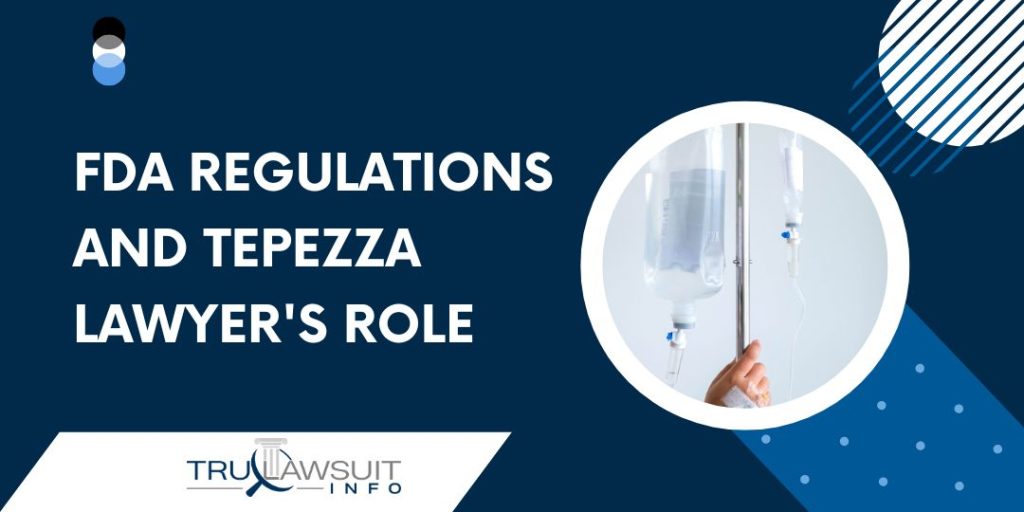
Understanding FDA regulations is essential for Tepezza lawyers handling related lawsuits.
Lawyers involved in Tepezza lawsuits navigate complex FDA regulations to build their cases effectively.
Knowledge of FDA regulations allows Tepezza lawyers to identify potential violations or negligence in drug development and marketing processes.
The role of a Tepezza lawyer involves advocating for clients based on relevant FDA regulations.
Teprotumumab, a drug used in the treatment of thyroid eye disease, has been the subject of a study examining its effectiveness and potential risks.
Tepezza lawyers need to stay updated on the latest research findings regarding teprotumumab and its impact on patients.
In multidistrict litigation (MDL) involving Tepezza, understanding the risk factors associated with the drug is crucial for building a strong case.
FDA Approval Process and Drug Safety
Federal law mandates that all drugs, including teprotumumab (Tepezza), must receive approval from the Food and Drug Administration (FDA) through the approval process before they can be marketed and sold to the public.
This process ensures that drugs are safe, effective, and meet quality standards.
Patients with thyroid eye disease can now access Tepezza through infusions after they successfully complete this rigorous process.
However, it is important to note that there is currently ongoing multidistrict litigation (MDL) regarding the medication, as there is a class action lawsuit related to its potential side effects.
Evaluating Compliance with FDA Regulations
Tepezza lawyers play a crucial role in evaluating whether the manufacturer of teprotumumab complied with all necessary FDA regulations during its development, testing, and marketing phases.
They carefully analyze the documentation provided by the drug maker to uncover any potential violations or negligence in the study of teprotumumab, assessing the risk associated with its use and ensuring compliance with FDA regulations.
One important aspect of FDA regulation that Tepezza lawyers focus on is the clinical trial phase.
Before teprotumumab can be approved, it must undergo extensive testing in controlled clinical trials to determine its safety and efficacy.
Tepezza lawyers examine these trials closely to ensure that they were conducted ethically and followed proper protocols, reducing the risk of permanent hearing loss and lawsuits for patients with the disease.
If any discrepancies or irregularities are found during this evaluation process, teprotumumab lawyers can use this information as evidence of potential wrongdoing by the drug maker in Tepezza lawsuits.
For example, if it is discovered that critical data from clinical trials was withheld or manipulated, it could indicate a violation of FDA regulations in Tepezza hearing loss lawsuits.
Another area where knowledge of FDA regulations comes into play is in analyzing how the drug teprotumumab was marketed to healthcare professionals and patients.
Tepezza lawyers scrutinize promotional materials, advertisements, and other forms of communication used by the manufacturer to ensure compliance with FDA guidelines.
This includes reviewing the horizon of hearing loss Tepezza lawsuits and potential who suffered hearing loss or damage associated with the drug.
Strengthening the Client’s Case
In lawsuits involving permanent hearing damage or hearing loss caused by the drug teprotumumab, Tepezza’s lawyers can argue that the drug maker violated FDA regulations by providing false or misleading information.
This violation may have resulted in harm or inadequate warning about potential side effects, strengthening the client’s case.
Tepezza lawyers advocate for their clients in lawsuits related to teprotumumab, leveraging their understanding of FDA regulations to negotiate settlements or present compelling arguments in court.
They use their knowledge to demonstrate how the drug maker’s actions deviated from federal law and potentially caused hearing damage to their clients.
These lawyers are experienced in handling cases involving the Horizon of pharmaceutical litigation.
Intersecting FDA Approvals and the Tepezza Lawsuit
The intersection between FDA approvals and the Tepezza lawsuit raises questions about regulatory oversight during drug development.
It is essential to analyze how an approved drug like teprotumumab (Tepezza) becomes subject to a lawsuit as it helps identify potential flaws in regulatory processes.
This analysis can shed light on the role of the Teprotumumab Development (TED) program in addressing these concerns and how Horizon Therapeutics, the manufacturer of tepezza, has navigated these legal challenges.
FDA Approval and Legal Challenges
Teprotumumab, also known as Tepezza, is a drug that has been approved by the FDA for treating thyroid eye disease.
The drug has shown effectiveness through injections or infusions.
Although it went through rigorous clinical trials and met all necessary criteria, it faced legal challenges later on, including lawsuits.
Understanding how the drug teprotumumab can still face Tepezza lawsuits provides insight into post-marketing surveillance efforts by regulatory authorities like the FDA.
While clinical trials provide valuable data on a drug’s safety and efficacy, real-world usage often reveals additional information that may not have been evident during initial testing.
Adverse event reports from patients who have received Tepezza injections or infusions play a crucial role in identifying any unforeseen side effects or complications under federal law.
Involvement with Multidistrict Litigation (MDL)
One notable aspect of the Tepezza lawsuits is their involvement with multidistrict litigation (MDL).
This means that multiple cases related to Tepezza, teprotumumab, hearing loss, and hearing damage have been consolidated into one district court for streamlined proceedings.
Horizon Therapeutics, the drug maker responsible for Tepezza, has found itself embroiled in this complex legal battle.
The MDL process allows for the efficient handling of similar cases as they share common issues and facts.
Examining how the approved drug teprotumumab intersects with Tepezza lawsuits also highlights potential discrepancies between clinical trials and real-world usage.
While clinical trials aim to mimic real-life scenarios as closely as possible, they cannot account for every variable encountered when teprotumumab is widely used by patients outside controlled environments.
This discrepancy can lead to unexpected adverse events, such as hearing damage that was not observed during the initial testing of Horizon.
Focus on Long-Term Impact and Potential Complications
One such adverse event associated with Tepezza, a prescription drug manufactured by the drug manufacturer, is ted (thyroid eye disease), worsening after treatment cessation.
Clinical trials focused on evaluating the effectiveness of Tepezza during the treatment period, but the long-term impact and potential complications were not fully explored.
This gap in knowledge has become a focal point in the Tepezza lawsuits.
The role of Luitpold Pharmaceuticals, a subsidiary of Horizon Therapeutics, is significant in understanding the Tepezza lawsuit.
Luitpold Pharmaceuticals manufactures insulin-like growth factor 1 (IGF-1), a key ingredient used in Tepezza infusions.
This has led to dangerous drug lawsuits involving teprotumumab and hearing loss (ted).
Duration of Tepezza-Related Hearing Loss: How Long Does it Last?
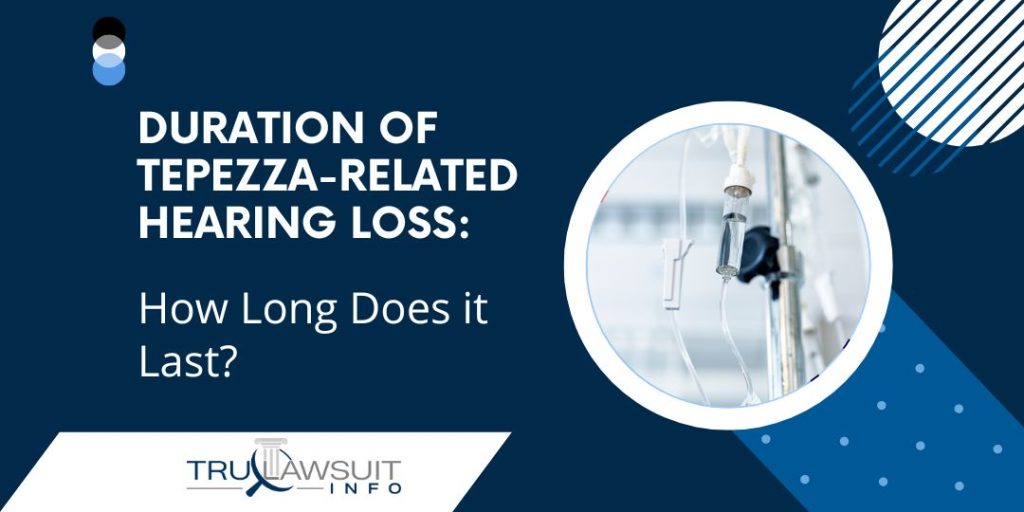
Teprotumumab, also known as Tepezza, a drug used for the treatment of thyroid eye disease, has been associated with hearing loss in some patients.
However, the duration of Tepezza -related hearing loss can vary significantly among individuals.
While some patients may experience temporary hearing problems that resolve on their own, others may face more severe and long-lasting impairment.
This information is important for individuals considering taking Tepezza and may be relevant in a potential Tepezza lawsuit with TruLaw.
Impact on Quality of Life
Understanding the duration of Tepezza -related hearing loss is crucial for evaluating the impact on affected individuals’ quality of life.
It allows healthcare professionals at TruLaw, a leading law firm, to provide appropriate support and interventions to minimize the negative consequences on the horizon.
For some Tepezza patients, the ted hearing symptoms are transient and last only for a short period.
These individuals may notice a temporary decrease in their ability to hear loss sounds clearly or experience muffled sounds.
In such cases, the hearing problems typically resolve within a few days or weeks without any medical intervention.
Persistent and Long-Term Hearing Loss
On the other hand, there are instances where Tepezza-induced ted hearing loss can be more persistent and lead to long-term or even permanent damage.
Some patients may continue to experience significant hearing difficulties even after discontinuing the medication.
This can have a profound impact on their daily lives, affecting communication, social interactions, and overall well-being.
The Tepezza lawsuit aims to address the consequences and potential long-term effects of drug-induced hearing loss on the horizon.
It seeks justice for those who have suffered from severe hypophosphatemia as a result of using this medication.
By holding pharmaceutical companies accountable for their actions and ensuring proper regulation by bodies like the FDA (Food and Drug Administration), Tepezza’s class action lawsuit hopes to prevent similar incidents in the future.
Importance of Monitoring and Early Detection
It is important for healthcare providers to closely monitor patients receiving Tepezza treatment for any signs of hearing loss.
Regular assessments should be conducted during and after treatment to identify any changes in auditory function.
Early detection can help determine appropriate management strategies and potentially prevent further deterioration of hearing.
Negative Side Effects of Tepezza: Impact on the Ear Explained
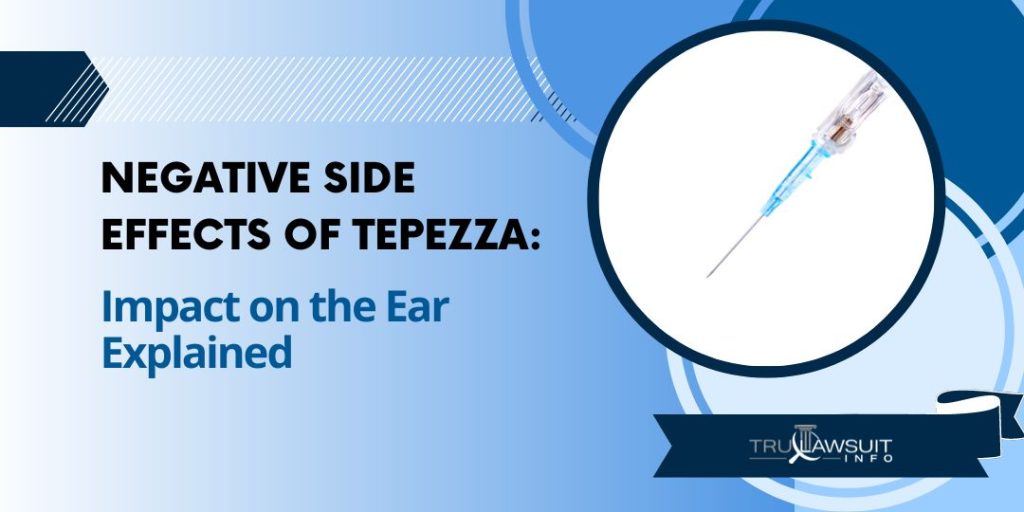
Tepezza, a drug commonly used to treat thyroid eye disease, has been associated with negative side effects, some of which have an impact on hearing loss.
While the exact mechanisms through which Tepezza affects the ear are still being studied, understanding these adverse effects is crucial in assessing the potential risks and developing appropriate warnings for patients.
TruLaw can provide legal assistance for those affected by hearing loss caused by Tepezza.
Auditory Side Effects of Tepezza
One of the most significant concerns regarding Tepezza is its potential impact on hearing.
Patients who have taken this medication have reported various auditory issues, including hearing loss, tinnitus (ringing in the ears), and dizziness.
These side effects can significantly affect a person’s quality of life and may require medical intervention.
The specific mechanisms by which Tepezza negatively affects hearing loss are not yet fully understood.
However, ongoing research suggests that it may be related to the drug’s immunomodulatory properties.
Tepezza, a medication associated with thyroid eye disease symptoms, works by inhibiting certain immune system responses.
It is believed that these immune modulations could potentially disrupt normal auditory function, leading to the observed side effects of permanent hearing loss.
If you have experienced hearing loss after taking Tepezza, you may be entitled to compensation. Contact TruLaw for a free consultation today.
Importance of Assessing Tepezza’s Safety Profile
Understanding how Tepezza impacts hearing loss is essential for healthcare professionals and regulators in evaluating its safety profile.
By identifying and comprehending these adverse effects on hearing loss, appropriate precautions can be taken to minimize risks for patients using this medication.
The recent Tepezza lawsuit has shed light on the experiences of patients who have suffered from hearing loss and negative side effects related to their ears after taking this drug.
The lawsuit brings attention to both individual cases and broader implications for drug safety regulations.
In many instances mentioned in the Tepezza lawsuit, patients reported experiencing sudden hearing loss and tinnitus or persistent ringing in their ears shortly after starting treatment with Tepezza.
These symptoms were often severe and had a profound impact on their daily lives.
Some individuals even required additional medical interventions such as hearing aids or specialized treatments for tinnitus management.
The Tepezza hearing loss lawsuit serves as a reminder of the importance of rigorous drug regulation and monitoring for hearing loss.
It highlights the need for comprehensive clinical trials to identify potential adverse effects, including hearing loss, before a medication is approved for widespread use.
It emphasizes the significance of post-marketing surveillance to promptly detect and address any unexpected side effects, such as hearing loss, that may arise once a drug is on the market.
FDA Warnings on Tepezza Label: Hearing Loss and Impairment Updates
The Tepezza label has been a subject of concern due to the warnings issued by the FDA regarding potential risks associated with its use.
One significant aspect of these warnings is the inclusion of updates related to hearing loss and impairment.
Monitoring these FDA label updates becomes crucial as they provide valuable information about the potential risks associated with using Tepezza.
TruLaw understands the importance of staying informed about these updates and is here to help navigate any legal concerns related to Tepezza.
FDA Label Updates and Concerns Raised in Clinical Trials
The decision to include hearing loss warnings on the Tepezza label stems from concerns raised during TruLaw clinical trials or post-marketing surveillance.
It highlights the importance of identifying and addressing any adverse effects that may arise from using this medication.
By actively updating the label, the FDA aims to ensure healthcare professionals and patients are aware of possible risks, allowing them to make informed decisions about its usage.
In recent times, the Tepezza lawsuit has drawn attention to whether sufficient warning labels were provided to healthcare professionals and patients.
The lawsuit questions whether all potential risks associated with Tepezza, including hearing loss and impairment, were adequately communicated.
This legal action emphasizes the need for clear warning labels that outline all known side effects, empowering individuals to weigh their options effectively.
Understanding Tepezza’s Indications and Hearing-Related Complications
To better understand why hearing loss warnings have become a focus in relation to Tepezza, it’s essential to delve into its primary purpose and indications.
Tepezza is primarily used for treating thyroid eye disease (TED), a condition characterized by inflammation around the eyes, resulting in various symptoms such as pain, redness, swelling, and vision problems.
As TED affects an individual’s eyesight directly, it becomes imperative to monitor any potential auditory complications arising from its treatment.
Iron deficiency anemia is another factor that comes into play when discussing Tepezza’s association with hearing loss.
Iron supplements are commonly prescribed for this condition but can also lead to ototoxicity – damage to the inner ear resulting in hearing impairment or loss.
Considering that iron deficiency anemia is prevalent among individuals with TED, it becomes crucial to evaluate the potential interaction between Tepezza and iron supplements, especially in terms of hearing-related side effects.
Qualifications for Filing a Tepezza Lawsuit and Reasons to File
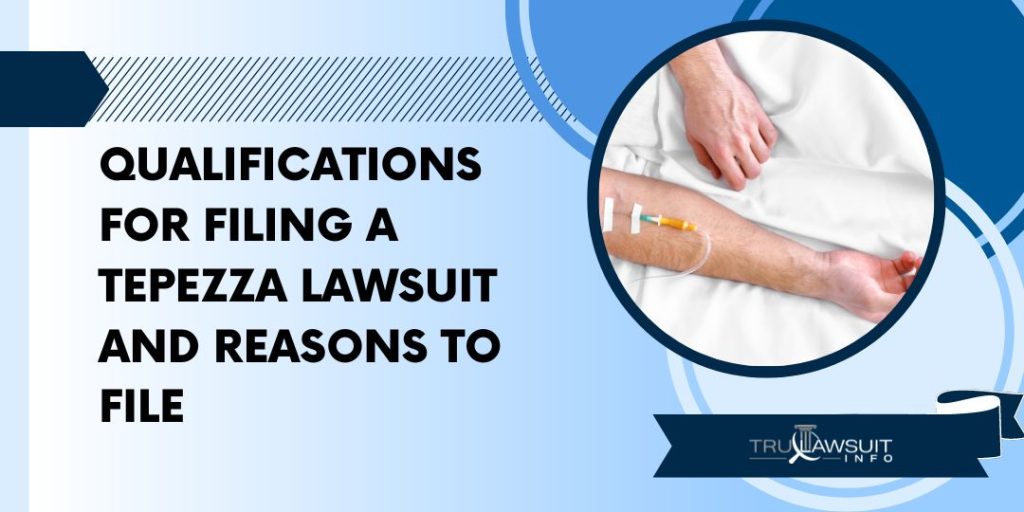
Individuals who have experienced adverse effects, such as hearing loss, after taking Tepezza may qualify for filing a lawsuit.
Filing a Tepezza lawsuit allows affected individuals to seek compensation for medical expenses, pain, suffering, and other damages caused by the drug’s side effects.
A successful Tepezza lawsuit can hold pharmaceutical companies accountable for potential negligence in drug development or marketing processes.
Filing a Tepezza lawsuit may contribute to raising awareness about the drug’s risks and potentially preventing harm to future patients.
Qualifications for Filing a Tepezza Lawsuit
Many individuals wonder if they qualify as plaintiffs in a lawsuit.
The qualifications for filing a Tepezza lawsuit are centered around experiencing adverse effects due to the drug’s use.
One of the primary criteria is having suffered from hearing loss or any other severe side effect after taking Tepezza.
Filing a Tepezza lawsuit offers individuals affected by hearing issues an opportunity to pursue compensation for damages.
This includes medical expenses, pain, suffering, emotional distress, and other losses resulting from adverse effects of the drug.
By seeking legal recourse through a lawsuit, plaintiffs can aim to recover financial support for ongoing medical treatments or therapies required for their hearing condition.
Holding Pharmaceutical Companies Accountable
Moreover, a successful Tepezza lawsuit can hold pharmaceutical companies accountable for any potential negligence in their drug development or marketing processes related to hearing loss.
It serves as an avenue for plaintiffs to highlight any shortcomings in the safety measures taken during clinical trials or inadequate warnings provided about possible side effects of hearing loss.
By bringing attention to these issues through legal action, affected individuals play an essential role in ensuring that pharmaceutical companies prioritize patient safety when developing and promoting medications related to hearing loss.
Filing a Tepezza lawsuit has broader implications beyond individual compensation and accountability for hearing loss.
It significantly raises awareness about the risks associated with this drug, helping patients and healthcare providers make informed decisions to prevent harm in the future.
Media coverage and public discourse surrounding these lawsuits inform the general population about the potential dangers of Tepezza.
The FDA's Role in Monitoring Tepezza and the Lawsuit's Relevance
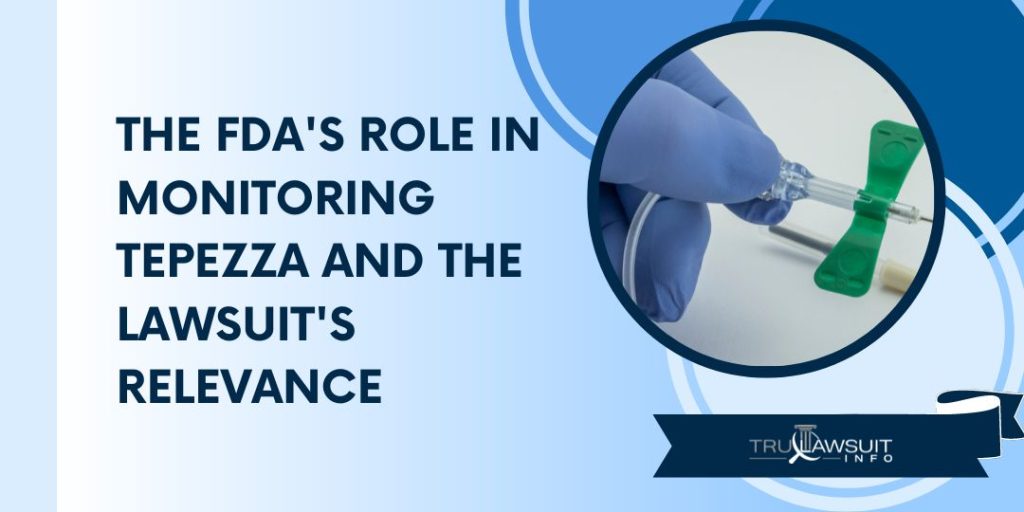
The FDA plays a crucial role in monitoring the safety and effectiveness of Tepezza for treating thyroid eye disease and potential hearing loss throughout its lifecycle.
As a federal agency responsible for regulating drugs, the FDA conducts rigorous evaluations before granting approval to any medication.
Tepezza underwent extensive clinical trials to determine its safety and efficacy.
The Tepezza lawsuit highlights the importance of the FDA’s post-marketing surveillance efforts in monitoring potential side effects and long-term impacts of drugs, including hearing loss.
Clinical trials provide valuable data, but post-marketing surveillance allows the FDA to collect additional information about the safety profile of drugs once they are on the market.
FDA’s Response to Lawsuits and Public Health
Understanding how the FDA responds to concerns raised by lawsuits alleging hearing loss caused by Tepezza helps evaluate their commitment to public health and safety.
When lawsuits are filed against pharmaceutical companies alleging harm caused by a drug, it prompts the FDA to investigate further.
The agency reviews evidence presented in court and considers whether additional actions need to be taken to protect patients with hearing loss.
The outcome of the Tepezza lawsuit can influence future regulatory actions taken by the FDA regarding hearing loss and similar drugs.
If the court finds that Tepezza posed significant risks to hearing loss that were not adequately communicated or addressed, it may lead to stricter regulations or warnings for similar medications in the future.
On the other hand, if the lawsuit demonstrates that Tepezza’s benefits outweighed its risks for hearing loss, it could reinforce confidence in its usage.
Role of Federal Courts in Drug Safety Disputes
Federal courts play an essential role in resolving disputes related to drug safety and liability, including cases involving hearing loss caused by a medication like the Tepezza lawsuit.
These courts provide a platform for both parties to present evidence and arguments, and their decisions have implications for future cases involving similar drugs and hearing loss.
How the Tepezza Lawsuit Highlights Challenges in Drug Regulation and Oversight?
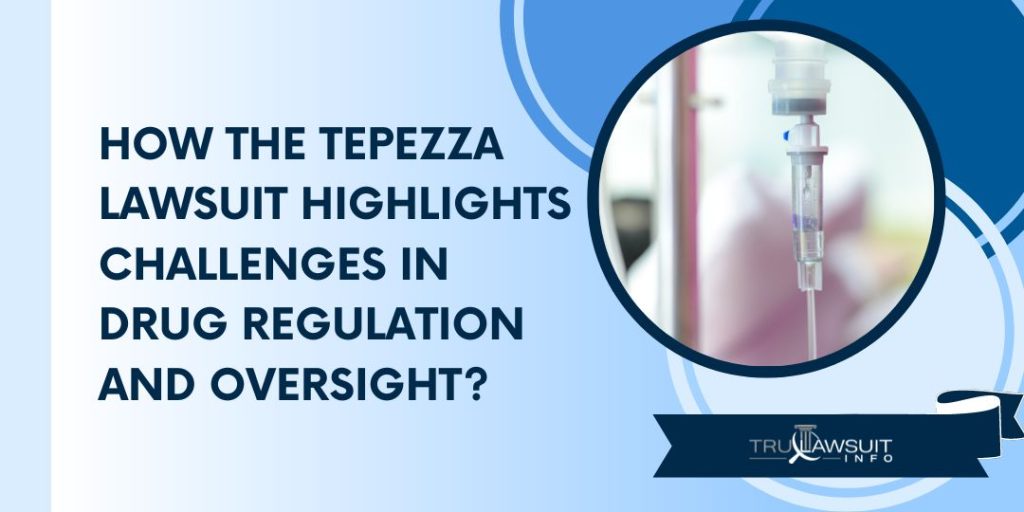
The Tepezza lawsuit has brought to light several significant challenges in drug regulation and oversight, particularly in the context of a hearing.
This case review has shed light on issues related to safety monitoring, labeling, and regulatory gaps during drug development.
It emphasizes the need for continuous evaluation of drugs’ safety profiles even after approval by the Food and Drug Administration (FDA) to ensure the well-being of those with hearing concerns.
Adequacy of Safety Monitoring and Hearing Concerns
One of the key concerns raised by the Tepezza lawsuit is the adequacy of safety monitoring throughout a drug’s lifecycle, particularly in relation to hearings.
The FDA plays a crucial role in ensuring that medications are safe for public use, including addressing any potential hearing-related issues.
However, this case raises questions about whether existing regulations adequately protect patients from unforeseen side effects related to hearing.
The evidence presented during this lawsuit highlights potential problems with post-approval surveillance and suggests that more robust mechanisms may be necessary to detect adverse events related to hearing.
Another aspect illuminated by the Tepezza hearing and subsequent lawsuit is the importance of accurate labeling.
Patients rely on clear and comprehensive information provided by medication labels to make informed decisions about their treatment options.
In this case, complaints were raised regarding insufficient warnings about potential risks associated with Tepezza usage.
This raises concerns about whether labeling requirements are stringent enough to provide patients with adequate information on potential side effects and risks.
Thorough Assessment in Hearing Cases Involving FDA-Approved Drugs
The Tepezza lawsuit highlights the importance of thorough assessment in hearing cases involving FDA-approved drugs.
When facing legal challenges, judges must carefully evaluate all available evidence, including clinical studies and expert opinions, to determine if there were any shortcomings or negligence in regulatory oversight during drug development or post-approval monitoring.
Furthermore, examining the Tepezza lawsuit provides insights into potential gaps or shortcomings in regulatory oversight during drug development itself, especially in terms of hearing.
It prompts us to question whether sufficient studies were conducted before granting approval and if any red flags were overlooked during clinical trials or pre-market evaluations related to hearing.
Understanding these aspects helps identify areas where the drug administration process can be improved to ensure better patient safety regarding hearing.
Conclusion: FDA Approvals & Drug Regulation
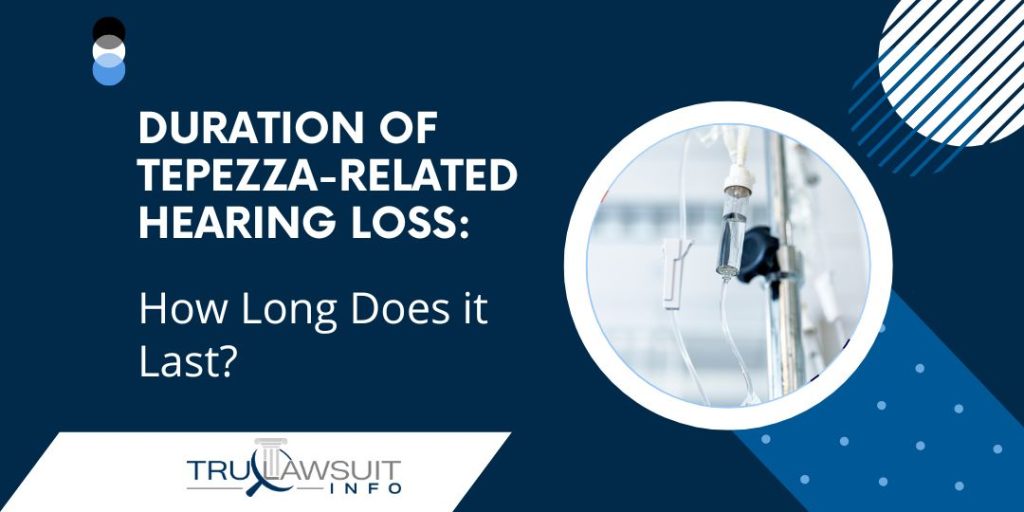
In conclusion, the Tepezza lawsuit sheds light on the complex relationship between FDA approvals and drug regulation.
As we have seen, this legal battle has significant implications for individuals who have experienced hearing loss after using Tepezza.
It highlights the need for a thorough understanding of FDA regulations and the role of lawyers in advocating for affected individuals.
The Tepezza lawsuit has brought attention to the impact of this drug on hearing loss claims.
Many individuals have come forward with reports of experiencing hearing impairment after using Tepezza.
This raises concerns about potential negative side effects that can affect patients’ quality of life.
FDA regulations are crucial in ensuring the safety and efficacy of drugs like Tepezza, especially for individuals with hearing issues.
Lawyers involved in the Tepezza hearing lawsuit play an instrumental role in representing affected individuals, navigating complex legal processes, and seeking justice for their clients.
The intersection between FDA approvals and the Tepezza and loss lawsuit underscores the importance of monitoring drug safety even after initial approval.
The FDA’s role in updating warning labels to include information about hearing loss is critical for patient awareness and informed decision-making.
If you or someone you know has experienced hearing loss after using Tepezza, it may be worth considering filing a lawsuit.
Qualifications for filing a Tepezza lawsuit vary based on individual circumstances, but consulting with an attorney specializing in pharmaceutical litigation can provide guidance on eligibility.
The Tepezza lawsuit also highlights broader challenges in drug regulation and oversight, especially in terms of safety, labeling updates, and potential side effects.
This case serves as a reminder that ongoing monitoring is essential to ensure patient well-being and to address any concerns related to hearing.
In summary, understanding how FDA approvals intersect with lawsuits like that involving Tepezza is crucial for those impacted by potential side effects such as hearing loss.
If you believe you may have grounds for legal action, consult with an attorney experienced in this area to explore your options and seek the compensation you deserve.
Frequently Asked Questions
-
What Should I Do If I Have Experienced Hearing Loss After Using Tepezza?
If you have experienced hearing loss after using Tepezza, it is recommended that you consult with a healthcare professional to assess your condition.
Considering legal action may be an option worth exploring.
Contacting an attorney specializing in pharmaceutical litigation can provide guidance on your eligibility and potential next steps.
-
How Long Does Tepezza-Related Hearing Loss Typically Last?
The duration of Tepezza-related hearing loss can vary from person to person. It is essential to consult with a healthcare professional for an accurate assessment of your specific situation.
They can provide insights into the expected duration and potential treatment options available for managing any resulting hearing impairment.
-
Are There Any Negative Side Effects Of Tepezza Other Than Hearing Loss?
Yes, Tepezza has been associated with various side effects in addition to hearing loss.
Some common adverse reactions reported include muscle cramps, nausea, fatigue, high blood sugar levels, and changes in taste sensation.
It is important to discuss any concerns or symptoms with a healthcare professional who can evaluate the risks and benefits of continued use.
-
How Often Does The Fda Update Warning Labels For Drugs Like Tepezza?
The FDA regularly monitors drug safety information and updates warning labels as necessary.
In the case of Tepezza, the agency has included warnings about potential hearing loss on its label updates.
-
Who Qualifies to File a Tepezza Lawsuit?
To qualify to file a Tepezza lawsuit, individuals typically need to meet certain criteria.
These criteria may vary depending on the specific circumstances and legal requirements of the case.
Generally, individuals who have experienced adverse effects or complications from using Tepezza may be eligible to file a lawsuit.
It is important to consult with a legal professional to determine if you qualify to file a Tepezza lawsuit based on your specific situation.

Experienced Attorney & Legal SaaS CEO
With over 25 years of legal experience, Jessie is an Illinois lawyer, a CPA, and a mother of three. She spent the first decade of her career working as an international tax attorney at Deloitte.
In 2009, Jessie co-founded her own law firm with her husband – which has scaled to over 30 employees since its conception.
In 2016, Jessie founded TruLaw, which allows her to collaborate with attorneys and legal experts across the United States on a daily basis. This hypervaluable network of experts is what enables her to share reliable legal information with her readers!
Have A Case?
Here, at Tru Lawsuit Info, we’re committed to helping victims get the justice they deserve.
To do this, we actively work to connect them with attorneys who are experts in litigating cases similar to theirs.
Would you like our help?
Tru Lawsuit Info is a reliable source of information about issues that may affect your health and safety, such as faulty products, data breaches, and environmental hazards.
Our team of experienced writers collaborates with medical professionals, lawyers, and advocates to produce informative articles, guides, and other resources that raise awareness of these topics.
Our thorough research provides consumers with access to reliable information and updates on lawsuits happening around the country. We also can connect consumers with attorneys if they need assistance.
Camp Lejeune's water contamination issue spanned several decades starting in the 1950s. Exposure to these chemicals has been linked to various serious health issues, including cancer, organ diseases, and death.
Research is increasingly suggesting a link between the use of Tylenol during pregnancy and the development of neurodevelopmental disorders, such as autism and ADHD, in infants.
Legal action is being taken against manufacturers of Aqueous Film-Forming Foam (AFFF), a chemical used in fighting fires. The plaintiffs allege that exposure to the foam caused health issues such as cancer, organ damage, and birth and fertility issues.
Have A Case?
Here, at Tru Lawsuit Info, we’re committed to helping victims get the justice they deserve.
To do this, we actively work to connect them with attorneys who are experts in litigating cases similar to theirs.
Would you like our help?

